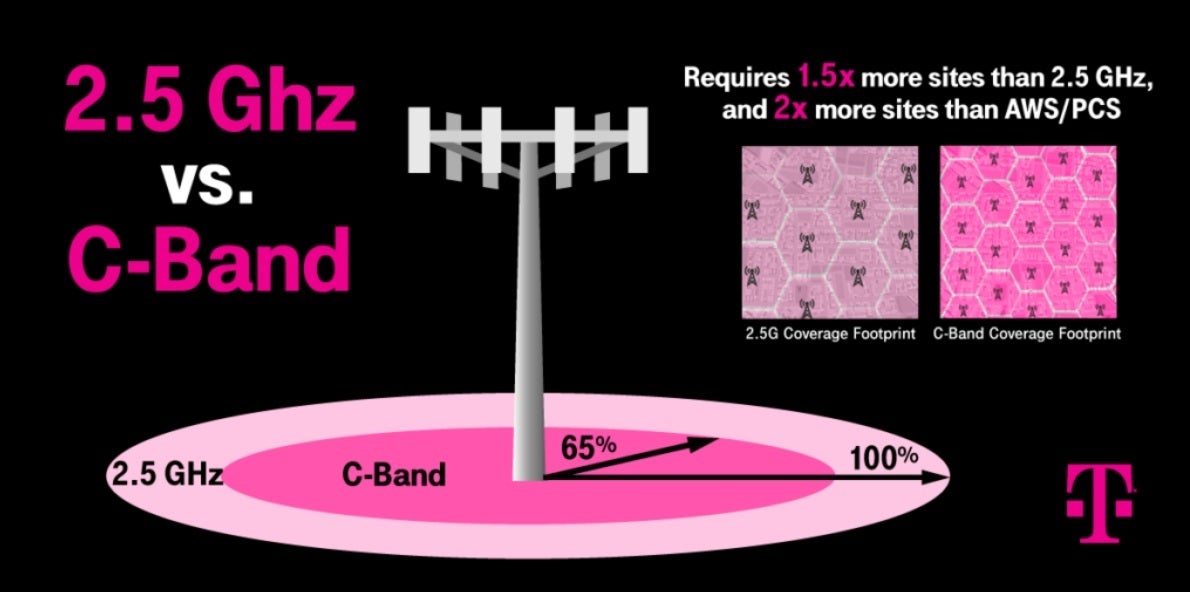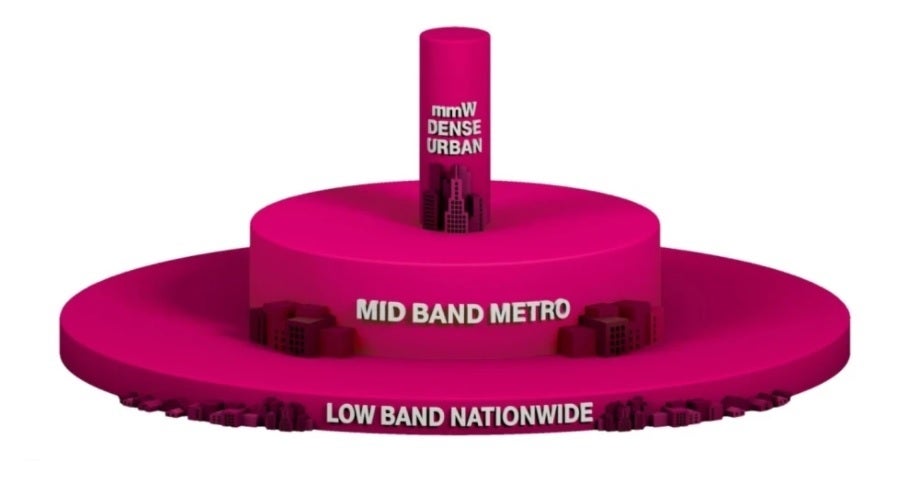T-Mobile believes that its triple layer cake will allow it to kick Verizon and AT&T's butt in 5G

T-Mobile published a press release today updating the state of its 5G build-out following the record breaking $81 billion C-band auction held by the FCC. Verizon and AT&T together spent $68 billion (Verizon shelled out $45 billion of that total) to add mid-range spectrum needed to improve their 5G signals. The FCC auctioned off spectrum in the 3.7GHz-3.98GHz range. T-Mobile, which was way ahead of the pack thanks to the ton of 2.5GHz spectrum it received in the acquisition of Sprint (c'mon now, you didn't think that T-Mobile bought Sprint to take over Sprint's wireless business, did you?), only laid out $9 billion in the auction. That's because it didn't need to add much more mid-band airwaves to its inventory.
When it comes to 5G in the states, right now T-Mobile takes the cake
T-Mobile CEO Mike Sievert, who thus far has led the nation's second largest carrier through a seamless transition following the departure of the legendary John Legere, gave a thorough explanation about why the C-Band auction was a victory for T-Mobile. The executive said, "T-Mobile customers are the clear winners in this auction. Our already industry-leading 5G network enabled us to be highly selective and strategic, concentrating our wins in top markets nationwide. As I predicted last fall, the other guys spent an unbelievable amount — because they had to. And even then, the truth is that C-Band is best for urban areas because it doesn’t propagate as well as T-Mobile’s substantial existing mid-band frequencies. For us, C-Band makes a great story even better, and we are incredibly pleased with our clear success in this auction. Our competitors had no choice but to go all in with a break-the-bank attempt to remain relevant in the 5G era."

T-Mobile's 2.5GHz mid-band spectrum travels 1.5 times the distance as C-Band
T-Mobile's President of Technology, Neville Ray, stated that "Simply put, Verizon and AT&T bet on the wrong horse — went all in on millimeter wave — and now they’re scrambling … and writing big checks … to try to catch up. Meanwhile we’re on track to deploy Ultra Capacity 5G nationwide before they can even get their hands on C-Band. There’s only one true 5G leader in the US, and that is T-Mobile. All of America wins with better connectivity, more competition, and value that we’re able to bring to consumers and businesses — forcing the other guys to do better for their customers as we always have."
If you want to know why mid-band spectrum is so important, let's look at the properties of high, mid, and low-band spectrum. Low-band travels farther which is why the carriers use it for their nationwide coverage. It also penetrates structures easily. What it doesn't offer are download data speeds much faster than 4G LTE; in fact, some speed tests have shown that low-band 5G is slower than 4G LTE. High-band airwaves deliver the fastest download data speeds. However, they do not travel long distances and are blocked by leaves, buildings and other structures. Mid-band spectrum provides download data speeds faster than low-band, but slower than high-band. The signals travel farther than high-band but not as far as low-band.
T-Mobile has been promoting its three-tier 5G mobile layer cake that combines mmWave, mid-band, and low-band signals for what many analysts believe will be the best overall 5G experience. The carrier now covers 287 million consumers with its Extended Range 5G service and 125 million with its Ultra Capacity 5G. The goal is to give 200 million people the access to Ultra Capacity 5G before the end of the year even before AT&T and Verizon have started using mid-band spectrum.
In the auction, T-Mobile won an average of 40MHz of C-Band covering 225 million people. But keep in mind that not all mid-band spectrum is the same. The C-Band spectrum auctioned off by the FCC does not travel as far as the 2.5GHz airwaves that T-Mobile obtained by buying Sprint; this is the spectrum used in T-Mobile's Ultra Capacity 5G and T-Mobile engineers believe that Verizon and AT&T will have to build 50% more cell sites "for meaningful and continuous coverage."

T-Mobile's 5G triple layer cake
For now, it seems that T-Mobile has the edge over Verizon and AT&T in 5G. That could change in the future, but for now T-Mobile takes the cake.
Follow us on Google News













Things that are NOT allowed:
To help keep our community safe and free from spam, we apply temporary limits to newly created accounts: